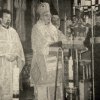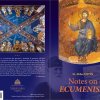Отварању легата уметника, који је као Младен Секуловић увек био поносан на своје српско порекло, присуствовали су министар културе Иван Тасовац, продуцент Дан Тана, глумчева унука Емили Дорнер и директор Кинотеке Југослав Пантелић.
Међу стварима које је Дорнер предала Кинотеци су и писмо које је Малден добио од Марлона Бранда, шешир који је носио у серији „Улице Сан Франциска” и плакета са звездом са холивудске стазе славних, а у плану је да догодине, посредством Тане, стигне и статуета Оскара коју је Малден 1952. освојио за најбољу споредну улогу, за лик Мича у чувеном филму „Трамвај звани жеља” Елије Казана.
Министар Тасовац истакао је да када год гледа неко од ремек-дела у којима је играо Карл Малден, неизбежна асоцијација му је снага воље.
– Оно што је Малдена чинило још већим јесте да никад није заборавио своје корене и што је увек са поносом истицао своје српско порекло – рекао је Тасовац и додао да је глумац често говорио да је радохолик, да се не стиди ниједне од својих улога и да га то одржава у животу.
Дан Тана је указао да је глумац цео живот провео као поносни Србин.
– Карл је у уметности био оно што је Тесла био у науци, или што је данас Ђоковић у тенису. Били смо пријатељи 50 година и говорили смо да је он поносни Србин, а ја Југословен – казао је Тана и додао да је пре месец и по дана успео да убеди Малденову супругу Мону и његове кћерке да неке од личних ствари уступе Југословенској кинотеци.
Глумчева унука Емили Дорнер оценила је да би њен деда био поносан што је она у Србији.
– Долазио је на утакмице да ме гледа како играм и био је редован на нашим породичним вечерама. Гледали смо га на великом платну, на малом екрану, и око нас. Био је свеприсутан. Сваког августа би организовао српски пикник, током ког би нам певао „Тамо далеко”. Био је поносан и скроман човек – рекла је Емили Дорнер.
Конференцији за новинаре у Кинотеци присуствовао је Горан Паскаљевић, редитељ „Сутона” из 1982, јединог филма који је Малден снимио у југословенској, српској копродукцији. У њему је тумачио повратника из Америке у Југославију, а лик се звао Марко Секуловић.
Малден је рођен је 22. марта 1912. у Чикагу од оца Петра Секуловића, емигранта из Билеће (Херцеговина) и мајке Марије чешког порекла. Каријеру је почео у позоришту, прво у Чикагу, а затим у Њујорку. На филму је дебитовао 1940. а током вишедеценијске каријере остварио је више од 70 улога. Уз освојеног Оскара, за ову награду био је номинован и за ролу у класику „На доковима Њујорка”, такође у режији Казана, а сарађивао је и са Џоном Фордом („Јесен Чејена”), Алфредом Хичкоком („Признајем”)… Добитник је награде за животно дело америчког Удружења филмских глумаца (2004), на Булевару славних у Холивуду постоји звезда с његовим именом, а од 1988. до 1993. био је председник Америчке филмске академије у Лос Анђелесу, где је и преминуо 1. јула 2009. године.
Извор: Политика





